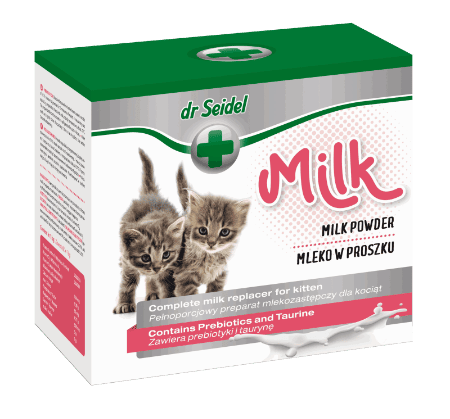Feeding orphaned puppies and kittens
Feeding orphaned puppies and kittens
Due to various random events, pet owners have to face a very difficult challenge: feeding orphaned puppies and kittens. Why mothers reject their offspring seems to be a separate issue. In any case, feeding puppies and kittens is one of the biggest challenges in dog and cat breeding. Every pet owner knows that the proper growth and development of a puppy/kitten guarantee their health in adulthood.

Under proper rearing conditions (with the presence and engagement of a bitch/queen), young organisms are fed with supplementary food until weaning. This is the case when the mother keeps feeding her children and the additional food is intended to teach them to eat something different than milk. Solid food, even in small quantities, also significantly speeds up the maturation of the digestive tract. This means that supplementary feeding before weaning also supports the proper development of the puppy.
Mother’s milk – or, immediately after birth, colostrum – is the puppy’s main food until weaning. Milk and colostrum differ slightly in composition, but they generally contain a high amount of fat and protein. If lactation is normal, the kitten/puppy develops relatively quickly and starts to be interested in food other than its mother’s milk as early as in the fourth week. If the bitch/she-cat is fed with commercial puppy/kitten food, the food the young starts eating will become its standard food after weaning. This makes weaning much easier. If the owner wishes to prepare food for the puppy/kitten by themselves, it is advisable to first introduce mushy food before weaning so that the puppy’s digestive tract can gently switch to solid food after liquid food. This also ensures proper and gradual maturation of the gastrointestinal tract of the young, which is important for their later growth and development. A similar procedure should be introduced in orphaned puppies/kittens.
Colostrum and, later, milk are the source of a number of biologically active compounds known to have a direct influence on the development of, inter alia, the digestive tract, preparing it to perform its functions in adult life. Thanks to high resistance to digestive enzymes, the majority of biologically active compounds present in colostrum and milk very effectively stimulate growth and differentiation of cells forming the digestive tract over a long period.
If kittens/puppies have no mother and/or no species-specific milk or colostrum, the situation is much more difficult. The owner has to face the challenge of feeding with a milk replacer. In this case, the most sensible solution is to use ready-made milk replacers available on the zoological market. Such products are balanced to best meet the specific nutritional requirements of young organisms. They contain the proper amount of protein, fat, free fatty acids and minerals, and are adapted to the metabolism of a given animal species.
As the nutritional requirements of kittens and puppies are diversified, it is necessary to use the products specifically designed for them. For example, a kitten milk replacer must include taurine which occurs naturally in queen’s milk. Taurine is also an essential nutrient in a daily diet of puppies. However, in this case, it should be used in lower concentrations. Taurine ensures the correct development of the nervous system and has a direct influence on the proper digestion of fatty substances. Iron and magnesium are essential for proper growth and haemopoesis (formation of blood cells) in both kittens and puppies. Adequate concentration of iron maintains the proper amount of red blood cells and haemoglobin in the developing young organisms. Magnesium supports the harmonious development of the nervous system and affects the metabolism of all nutrients, ensuring their efficient utilisation in the metabolic processes of young organisms.
To ensure the proper growth and development of puppies and kittens, it is necessary to maintain the function of the digestive tract. Under normal conditions, this task is performed by a number of compounds naturally present in colostrum and milk of queens and bitches. In orphaned kittens and puppies, this is only possible with a well-balanced milk replacer containing prebiotic components. Their aim is to stimulate the growth of beneficial intestinal microflora and to protect the intestinal barrier. Thanks to prebiotics, the bacteria in the digestive tract produce a number of metabolites, including short-chain fatty acids, and other metabolites of probiotic bacteria, generally referred to as postbiotics, which play a pivotal role in all functions of the organism and, most importantly, protect young, developing organisms from the adverse effects of external conditions.
In addition to milk replacer, it is necessary to create the right conditions to reduce stress. Small kittens/puppies need to be kept warm and protected from draughts. By the time they are one week old, the temperature in the tray should be 30–32°C. Young kittens/puppies catch a cold easily because their natural temperature regulation does not work properly yet. During the first three weeks of life, the ambient temperature for the young should be approx. 30°C. After each meal, the temperature of which should not be lower than 37°C, massage the belly towards the anus. This stimulates the intestines to work and defecate. Wash the muzzle after feeding with warm water and a cotton swab. Then wash the area around the anus and wipe it dry. A friendly queen/bitch taking care of the hygiene of the kittens/puppies can be an ally to the owner who has decided to feed the orphaned kittens/puppies.
Milk replacer can be also used as an additive to the food of lactating queens or bitches. This enhances the nutritional value of the food and satisfies the increased demand for nutrients during lactation.
Dr Jacek Wilczak
Assistant Professor
INSTITUTE OF VETERINARY MEDICINE
Department of Physiological Sciences
Department of Biochemistry and Dietetics
7 January 2021

